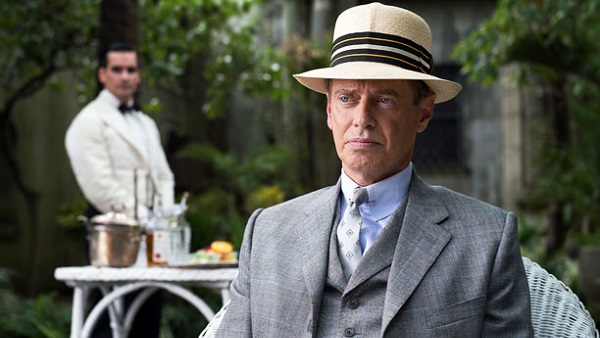
Boardwalk Empire, Season 5, Episode 1: “Golden Days for Boys & Girls”
Written by Howard Korder
Directed by Tim Van Patten
Airs Sundays at 9pm EST on HBO
There is an air of finality to even this first episode of Boardwalk Empire‘s final season. From the opening scene to the final moments, “Golden Days for Boys & Girls” has the distinct feeling of a ticking clock. Ironically while the episode takes its sweet time, from skipping out on several of the shows most notable characters to adding in recurring flashbacks of the childhood of the Thompsons, it only further solidifies the fact that this is the end. Like the last ruminating drink of a dying man, the simplest of things only matters more with the end in sight.
The shocking time jump from 1924 to 1931 establishes this with a sharp and quick brutality. The roaring twenties are long gone, and in their wake, our characters are left with a ghost-like reality of their former selves trailing them like smoke. Arnold Rothstein, a major player from the shows beginnings, is several years dead, and risen in his place is his former protege, the always quick, always smart, Meyer Lansky.
Likewise, Joe Masseria is abruptly usurped by a very different Lucky Luciano. No longer wise-cracking and trash talking, this hang-dog Luciano carries out the execution of his boss with a detached coldness and the most basic impatience. “What the fuck took so long?” he asks his assassins when the job is complete. His only words for the man he served for nearly a decade of his life are spoken in Italian over a bloody corpse: “The fight is over.”

Margaret, a character who seemed poised for success at the end of season 4, still seems to be doing relatively well, though her formerly cocksure boss is an echoing shell of himself as he sells the office on the infinite idealism of a Mickey Mouse short before blowing his brains out in front of them. “Everything’s gonna work out fine!” he exclaims with his finger on the trigger, and a smile on his face, and suddenly we’re reminded of the final seasons recurring tagline which promises that no one goes quietly.
The changes in Chalky’s life are the most quickly recognizable, and the most jarring by a long shot. His first appearance is that of a bearded and disheveled inmate being carted into the forest for some hard labor. He is cast opposite a constantly smirking, folk song singing, son of a bitch who handily drops his happy demeanor when he stages a dramatic revolt against the prison guards. Chalky seizes his chance and escapes like the rest but is tackled for his efforts by the smarmy rogue himself. With all pretenses dropped, the man demands to know if he is versed on how to use a telephone. When Chalky bewilderingly answers in the affirmative, it seems to be the only thing that saves his life. These scenes are easily the episode standouts, and the story of how the most powerful colored man in Atlantic City has found himself in such dire and desperate straits is the most promising mystery of all.

Finally, we’re left with the man himself, Nucky Thompson. Unsurprisingly, he appears to be the character who has changed the least since we last saw him. With the coming repeal of the Volstead Act, a deal with Bacardi that promises legitimacy, and his buxom siren/savvy partner Sally on his arm, this is very much the Nucky we might expect to see. It is also the story most rife with references of things to come, from the Cuban Revolution to the end of prohibition. However, in the wake of the gorgeous Cuban visuals, and their parallels within Nucky’s troubled but eventful childhood, one begins to wonder if this is the beginning of the end for Atlantic City’s former treasurer.
A distinct dichotomy is rapidly emerging with the treble and bass of the second seasons plot line. Fans will recall that Boardwalk Empire‘s sophomore year focused on the younger generation of gangsters attempting to subvert and topple their elders with little to no results in their favor. Now, with many of those same faces now succeeding their former masters, it seems to be a very different world that our central character now lives in. Should he be challenged once more, does he still possess the ice-cold sensibilities to survive in this new reality, or has his increasing distance from his home made him into another man entirely? This question is begged through direct action when an attempted assassination is once again undertaken in his name, although the culprit is revealed as knowing nothing about him but his candor and seeming financial aptitude. In the aftermath we find that Nucky has not survived another attack at his throne, but a meaningless play for his displayed wealth.
It is a time of ascension in the kingdom of Boardwalk Empire, and as we all know, with every man’s rise, comes another man’s fall. With seven more hours to decide his fate, there is no clear distinction as to which side of this coin our longstanding protagonist will finally fall.

